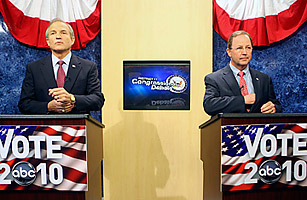
Texas Democratic Representative Chet Edwards, left, and his opponent, Republican Bill Flores, prepare for a debate Sunday, Oct. 24, 2010, in Waco
(2 of 2)
Flores has proved a stronger, more viable candidate than past challengers, but he has tripped on a couple of occasions. Edwards' advocacy for veterans has been a linchpin of his work in Congress and on the campaign trail. He often speaks to local groups about veterans' issues and their sacrifices as he tours the district with his "Vets for Chet" volunteers, so he seized on a Flores debate remark that veterans would "better off" if they saw private doctors. That would lead to the dismantling and privatization of the VA, Edwards said. Flores responded that he wants to allow veterans to utilize local private medical services rather than make long trips to VA medical centers. To underscore the message, Flores put up an ad featuring Senator McCain. "He's a patriotic American who's proven he's devoted to taking care of our veterans," McCain says in the ad, "and Bill's ideas to improve veterans' health care are exactly the same as mine."
"No question, Edwards is in a tough race," says Cal Jillson, a political scientist at Southern Methodist University. "But I always say that you can lose a lot of money betting against Chet Edwards in this district. He is a good retail campaigner and works the district assiduously between elections. Anyone who chooses to bet against Edwards should save out the rent money."
The only televised debate came on Oct. 24, six days after early voting was under way. There were no knockout blows, but candidates were given an opportunity to pose a question to their opponent. Edwards appeared to be "visibly taken aback," according to the Dallas Morning News, when Flores asked him to detail his fiscal conservatism. As for Edwards, he challenged Flores on his alleged support for privatizing Social Security. Edwards final ad pushes that hot button, claiming that Flores also wants to kill the Department of Education and block a veterans' hospital. Both national parties have poured funding into the race, and Edwards will benefit from a half-million-dollar ad buy in the final week thanks to the Democratic Congressional Campaign Committee (DCCC). The National Republican Congressional Committee (NRCC) and conservative funding organization American Crossroads have roughly matched that support, but the NRCC chose to move its late-game ad money out of the race. The Flores campaign spun the NRCC decision as a sign of confidence in a Republican victory, while the Edwards' camp said it was recognition that Flores was "floundering."
Should Edwards survive this toughest challenge, he will be in the crosshairs again as the Republican-dominated redistricting proceeds, with a possible four additional seats for Texas as the prize. If the past is prologue, the new seats will reflect the new Texas — split between conservative Anglo and liberal minority districts. In a deeply red state, there will be little room for Blue Dogs like Edwards.